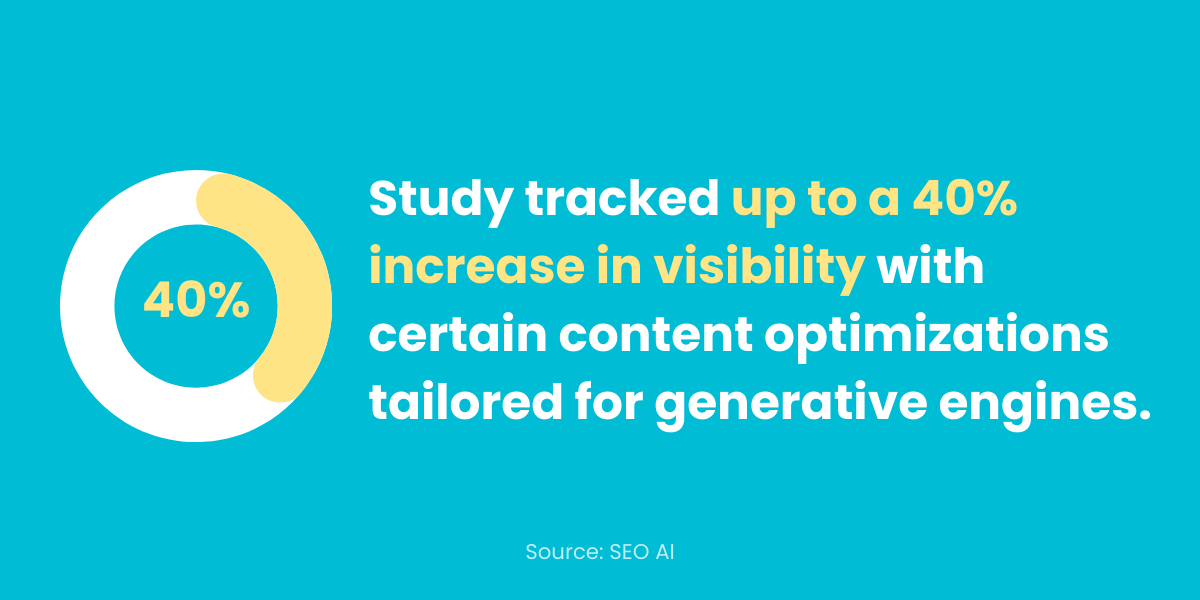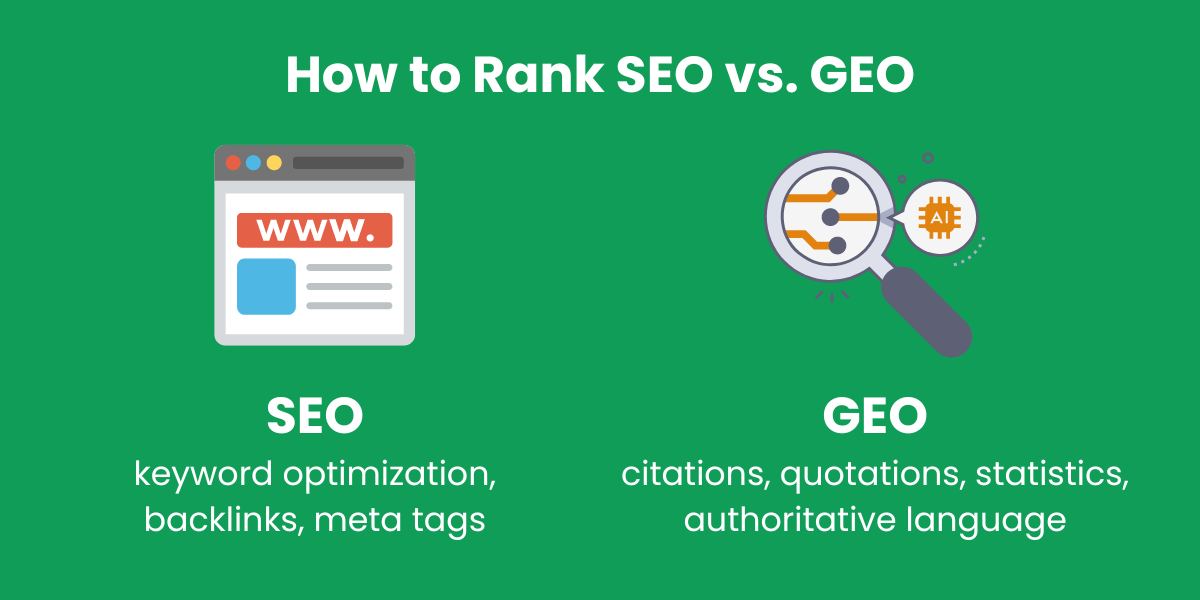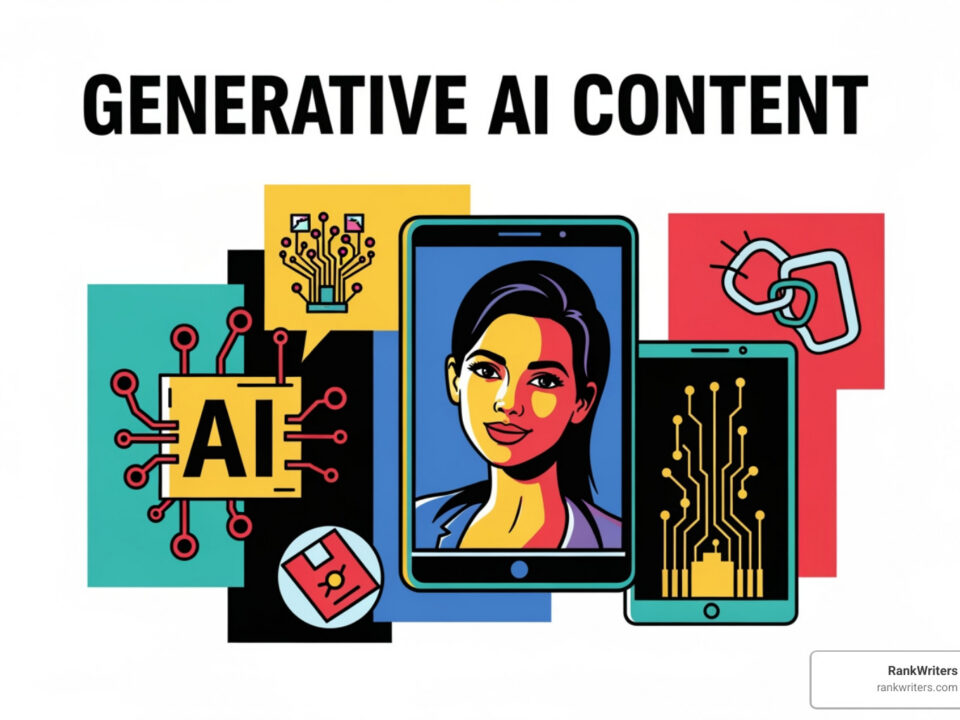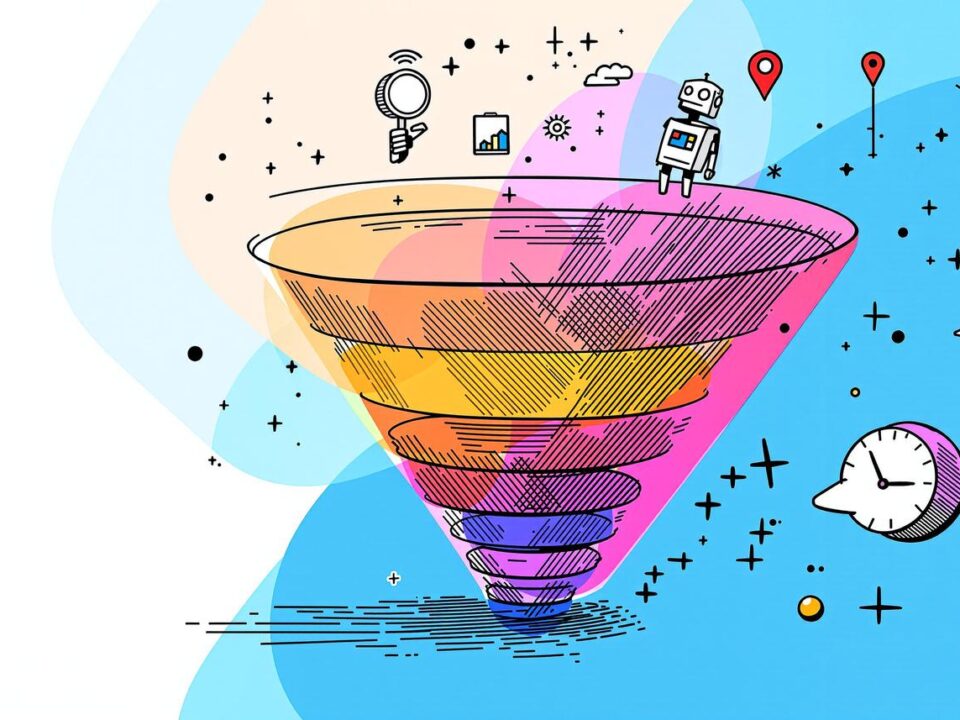The digital world changes fast. What worked yesterday might be obsolete tomorrow, especially regarding SEO. As search engines become smarter, we have to up our game. That’s where this whole GEO vs. SEO conversation comes in.
For years, Search Engine Optimization (SEO) was the gold standard. But the rise of AI-powered search has given birth to Generative Engine Optimization (GEO). This begs the question – is GEO about to replace traditional SEO?
Unpacking the Differences: SEO vs. GEO
SEO is like the dependable friend who helps you get your website noticed on traditional platforms like Google. You focus on things like keywords, backlinks, and site structure so you can rank higher on search engine results pages (SERPs). You are essentially playing by Google’s rules to get ahead.
On the other hand, GEO optimizes for AI-driven search engines. These AI engines aim to provide direct answers and summaries, often without even needing to click a link. Think ChatGPT, Google’s AI Overviews, and platforms like Perplexity.

Content is King, but Context is Queen
Both SEO and GEO prioritize top-notch content. However, SEO has traditionally leaned more into keyword optimization, ensuring your website uses the right words to attract those Google search spiders.
GEO turns up the volume on content that directly answers user queries. It ensures your content is the most accurate, authoritative, and relevant response. Think of it this way: would a generative AI pull from your article to synthesize an answer?
The Metrics That Matter: GEO vs SEO
In the old SEO world, clicks were everything. But evidence suggests that employing GEO strategies can lead to an average 30% improvement in impressions. For example, ChatGPT has over 180.5 million monthly active users, while Perplexity AI’s search volume has surged by 858% in the past year.
It now has around 10 million active monthly users. With GEO, being the chosen source within AI-generated summaries is a major win. So instead of tracking just clicks, you’re also interested in how often your content gets cited or featured.
The Power of GEO: Real-World Impact
Let’s say you are a plastic surgeon. In the world of traditional SEO, you would target keywords like “best rhinoplasty” or “facelift cost.” You might also invest in cold calling lead generation to reach more potential patients.
Now, let’s add GEO to the mix. Imagine someone searching for “What is the best age for a facelift?” An AI-powered search engine sees your website with detailed, expert-written content on the topic, complete with statistics, research citations, and patient testimonials. Guess whose website becomes the star? Yours.
Can GEO and SEO Co-exist?
This isn’t a case of ditching your old friend for a flashy new one. It is more like introducing your friends and letting them play together.
A solid online strategy embraces both SEO and GEO. It’s like having a one-two punch for digital dominance. SEO helps you lay the groundwork with a user-friendly website and keyword-optimized content.
This ensures your website is discoverable in search engines. Then GEO comes in, supercharging your content to be the go-to resource for AI-driven platforms. These AI technologies are changing how people search for information.

Tips for Navigating the GEO vs. SEO Landscape
Here’s the deal – things change quickly in the online world. Strategies that work wonders today might not have the same impact tomorrow. But this whole SEO vs. GEO evolution presents some interesting questions about what to expect as content creators.
Future-Proofing Your Content in the Age of AI
A recent study by Gartner predicted that by 2026, generative AI would cause a 25% decrease in overall search volume. This is because more searches begin and end with an AI response. Since the landmark rollout of Chat GPT by Open AI in the fall of 2022, SEO professionals have been making sense of the future of SEO.
These predictions were bolstered this year when Google announced generative AI would become more prevalent in standard searches. It is clearer than ever that search engine optimization must now take AI and generative experience into account. So as AI’s presence in our lives increases, brands must shift gears.
They must find ways to appeal to these AI gatekeepers as much as human visitors. But what can be done? How can we work with this evolving digital landscape instead of against it? One way to ensure your content is visible is by incorporating generative engine optimization best practices.
Tips for Optimizing for GEO
- Make friends with E-E-A-T. Google’s framework for evaluating content’s Experience, Expertise, Authoritativeness, and Trustworthiness applies tenfold to GEO. Focus on establishing credibility, and AI will notice.
- Embrace different formats. Mix things up with text, lists, tables, images, and even videos. Rich, multifaceted content is catnip for AI.
- Make it skimmable. Short paragraphs, clear headings, bullet points – anything that makes your content easily digestible for both humans and bots is key.
- Go niche. Don’t be afraid to go deep into specific aspects of your field. The more authoritative you become within a niche, the better your chances of becoming the go-to source for AI.
FAQs about GEO vs SEO
What is the core difference between GEO and SEO?
SEO focuses on boosting a website’s visibility in traditional search results, primarily driven by keywords and backlinks. GEO optimizes content for generative AI platforms that aim to understand and respond to user queries directly.
Do I need to choose between GEO or SEO?
Not necessarily. Think of them as two sides of the same coin. Both approaches are beneficial for different aspects of online visibility. Ideally, a well-rounded approach includes SEO fundamentals with a GEO-focused edge.
This encompasses things like user-friendly web design, incorporating high-volume keywords, and using keyword optimization strategies. And of course, crafting helpful, high-quality content should remain a top priority for any digital marketing campaign.
How can AI be beneficial in SEO and digital marketing?
This is a very popular topic in marketing right now. AI offers many solutions that have never existed before and has made large changes to several different sectors of marketing already in 2023 and 2024. More than half of marketers are already utilizing AI, while more than 80% agree that AI has impacted SEO positively.
Some people and brands are apprehensive, thinking that it might negatively affect things, however, with just a small amount of education, that fear can be replaced with an empowering new way of thinking about it all. It can provide several advantages, including improved content creation and marketing automation opportunities that would be too arduous for a team of marketers to accomplish alone, without Generative Engine Optimization. Other marketers believe that content automation platforms will become a much larger focus as generative AI progresses over time. For more info, be sure to check out this post: Generative AI.
How fast is the online world transitioning to AI?
Things are definitely changing rapidly. Although some fear that Google will be completely overtaken by platforms like ChatGPT in the next couple of years, the fact is that Google still boasts almost 100 billion searches a month, compared to ChatGPT’s 2 billion. This means that incorporating generative AI strategies is smart to remain competitive. You can use tools such as SEO lead generation tools to attract potential customers looking for a business like yours. So the name of the game right now is to keep your content optimized for both.
How often are businesses using AI-generated content?
Research shows that by 2030, AI is projected to generate nearly one-third of outbound marketing material. The writing is on the wall – generative AI is changing the game. Even in late 2023, this prediction seemed achievable as marketing departments had already begun actively integrating these advanced technologies into their operations. This includes utilizing a blend of search engine optimization along with innovative local SEO strategies for small businesses.
Research suggests that early adoption can result in a serious advantage. To help brands adjust to this rapidly evolving world of generative AI and how it affects SEO, several platforms have released techniques. One example is Content at Scale’s detailed overview on Generative Engine Optimization. But beyond optimization tools, AI’s benefits are quite broad in scope. Business owners are excited by its ability to simplify workflows and boost productivity without compromising ethical practices, such as ensuring your ads meet quality guidelines. Many even consider using AI Prompt Engineering courses to hone their generative content even further.
Conclusion
GEO vs. SEO is more about evolution, not revolution. As technology advances, so should our approaches. While the full implications of this shift are still unfolding, embracing a content-first approach, understanding user intent, and utilizing tools to adapt remain crucial in both worlds. GEO vs. SEO will continue to be an ongoing conversation. Those brands and marketers who pay close attention to the trends will reap the most benefits in their content marketing efforts.
















